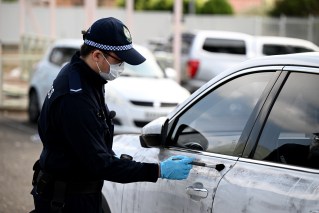Revenue NSW used Robodebt-like technology

The NSW Ombudsman pursued Revenue NSW over the use of Robodebt-like technology to recover money. Photo: AAP
The NSW Ombudsman has raised concerns about the state government’s use of Robodebt-style artificial intelligence to garnishee the bank accounts of vulnerable people with overdue fines.
Ombudsman Paul Miller tabled a report on Monday into the practice after complaints were made about Revenue NSW, the money-gathering arm of the government.
“Many of the complainants were financially vulnerable individuals who, in some cases, had their bank accounts emptied,” the report said.
Those who complained were unaware machine technology was being used by Revenue NSW.
“They were just concerned that their money had been taken, in some cases leaving them with no money in their account to pay rent or buy groceries,” it said.
“Following our intervention, and to its credit, Revenue NSW took a number of steps to address our concerns about unfairness.”
However, as the ombudsman’s office learned more about how Revenue NSW was using machine technology to issue garnishee orders “we became increasingly concerned about the lawfulness of its conduct”.
The ombudsman’s office made a number of formal suggestions, including that Revenue NSW sought expert legal advice on the legality and design of its machine technology system.
However, Revenue NSW “did not seek any expert internal or external legal advice on the design and operation of its machine-aided garnishee system, even after we told them they should”.
The ombudsman’s office sought its own legal advice, which found the authority and responsibility for exercising a statutory function could “only be conferred on or delegated to a legal subject (a someone) and not a legal object (a something).”
In response, Revenue NSW has now adopted a “minimum protected balance”, meaning a minimum of $523.10 must be left in accounts subject to garnishee orders.
It has also implemented a “hardship policy” to protect vulnerable people from garnishee orders as well as requirements for human verification in some decisions.
The ombudsman pointed to problems with the federal government’s Centrelink automated income compliance program — dubbed Robodebt — which was later scrapped.
The system used by Centrelink was flawed and generated erroneous debt notices and “offers a cautionary tale for government use of machine technology”.
“This case study demonstrates the capacity for errors to impact on a large scale when machine technology is involved, and the importance of agencies obtaining and thoroughly considering legal advice when designing machine technologies to ensure they are applying the correct interpretation of legislation.”
NSW Labor criticised Revenue NSW, labelling the funds gathering tactic as “Robodebt 2.0”.
Under the automated system, the number of garnishee orders increased from 6905 in 2010/11 to more than 1.6 million in 2018/19.
“Not only are these actions unlawful, they demonstrate the Liberal government is heartless when it comes to looking after our most vulnerable. It is completely wrong and immoral,” Labor finance spokesman Anoulack Chanthivong said.
The ombudsman understands Revenue NSW is considering further changes to its garnishee system.
“We will continue to monitor developments,” it said.








